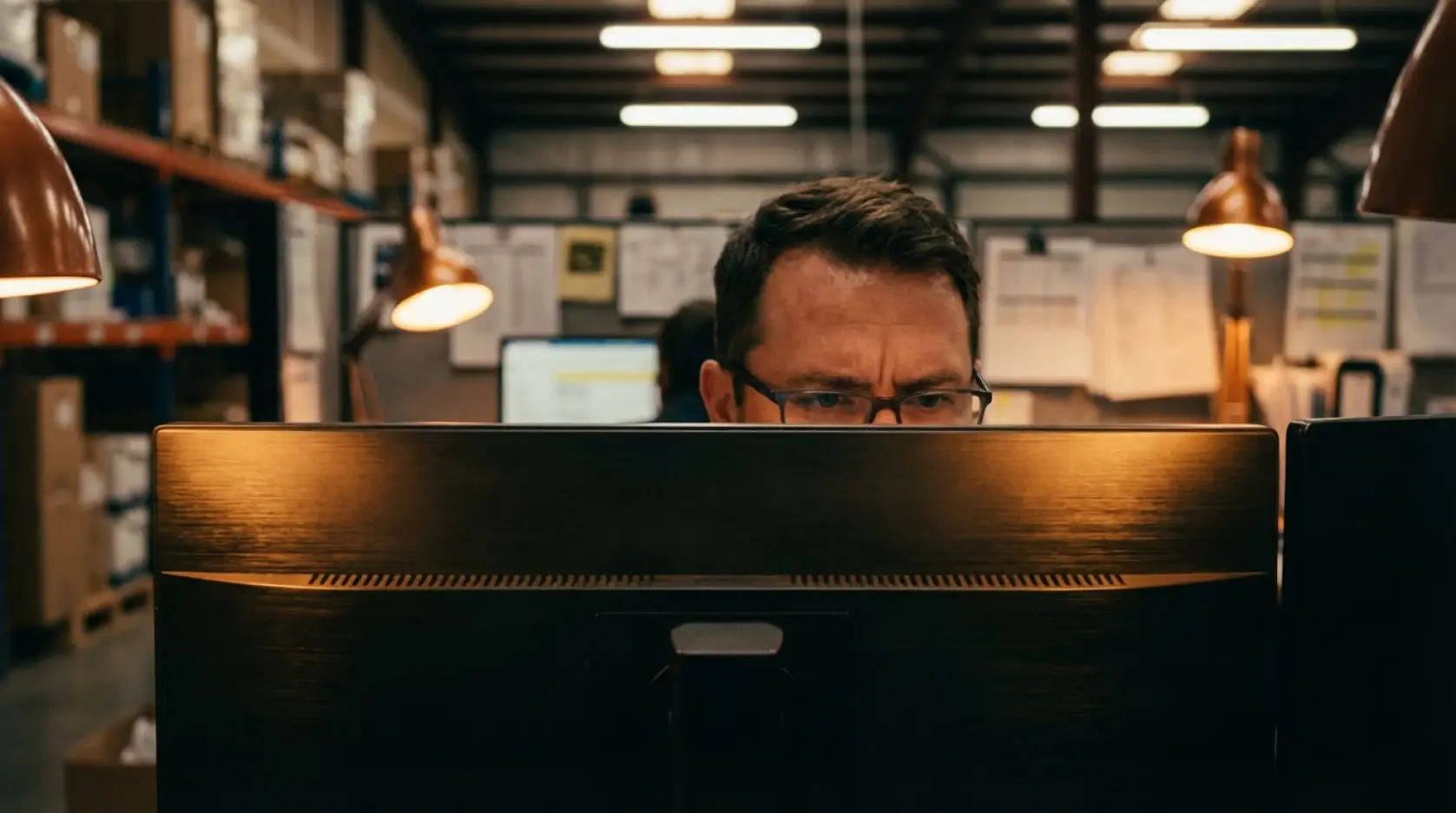Table of Contents
-
What Is Party Rental SEO?
-
Why Party Rental Businesses Need SEO More Than Ever
-
How to Set Up Your Party Rental SEO Strategy
-
Create Content That Converts Searches Into Bookings
-
Technical SEO: The Behind-the-Scenes Magic
-
Build Authority Through Smart Link Building
-
How to Measure Your SEO Performance
-
Your Next Steps: Building SEO Into Your Business
You’ve got the perfect inventory — stunning linens, elegant centerpieces, and that show-stopping photo booth that everyone raves about. Your events are flawless, your clients are happy, and your referrals are steady.
But when someone in your city Googles “party rental near me,” they’re not finding you. They’re finding your competitor who figured out SEO three years ago.
If you’re tired of watching potential clients slip through your fingers because they can’t find you online, you’re in the right place. Party rental SEO doesn’t have to be rocket science. Here’s how to make it work for your business.
What Is Party Rental SEO?
Search engine optimization (SEO) for party rental businesses is the art and science of making your website show up when people search for your services online. Think of it as digital real estate — you want to own the prime spots when someone searches for “tent rental,” “chair rental,” or “party supplies” in your area.
The goal isn’t just to appear in search results; it’s to appear first when your ideal client is actively looking for what you offer. Because let’s be honest — when was the last time you clicked to page two of Google search results?
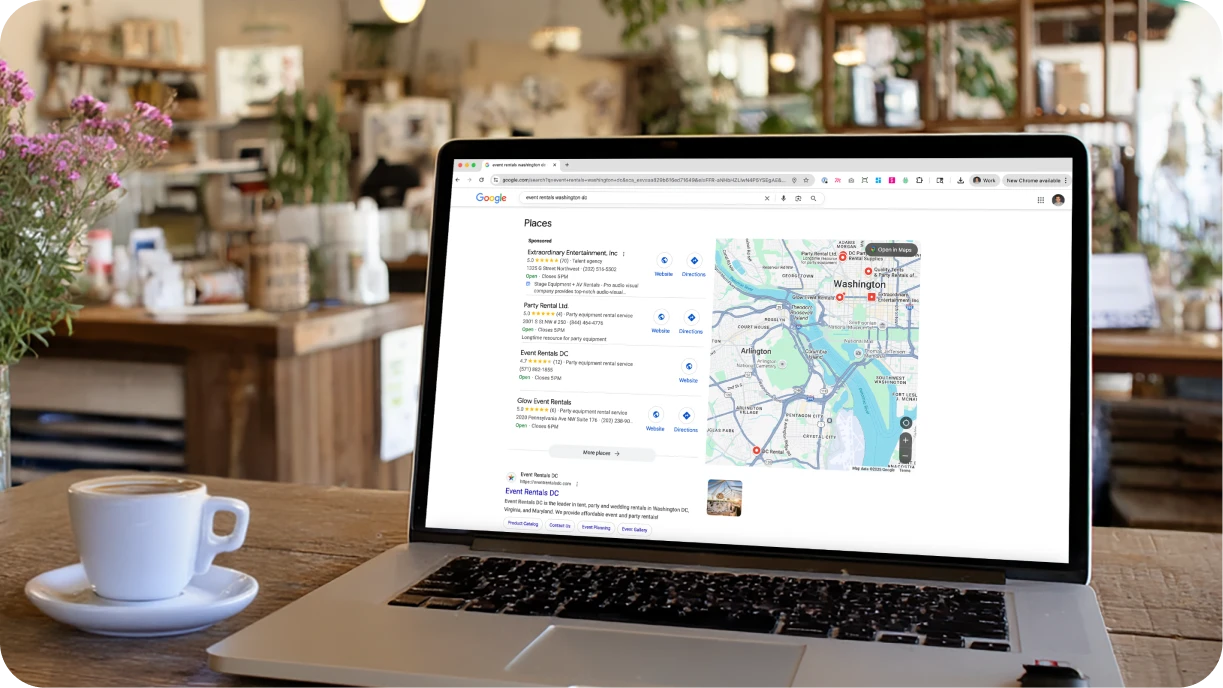
Why Party Rental Businesses Need SEO More Than Ever
The event rental industry has become incredibly competitive. Your potential clients aren’t just comparing you to the rental company down the street anymore — they’re comparing you to every business that shows up in their search results.
Here’s what’s happening in your market right now:
- 76% of consumers who search for “near me” visit a business within a day
- 88% of smartphone users visit a store within a week after performing a local search
- 80% of US consumers search online for local businesses at least once per week
That means if you’re not visible in search results, you’re missing out on a massive stream of ready-to-buy customers who are actively looking for your services.
How to Set Up Your Party Rental SEO Strategy
But where do you get started? Here are the basics:
Start with Local SEO Basics
Your party rental business serves a specific geographic area, which means local SEO should be your bread and butter. Here’s how to nail the fundamentals:
- Claim and optimize your Google Business Profile (GBP): This is your digital storefront. Make sure your business name, address, and phone number are consistent across all online directories. Add high-quality photos of your inventory in action, respond to reviews, and keep your hours updated. We’ve got a guide that covers Google Business Profile setup step by step ->
- Create location-specific content: If you serve multiple cities, create dedicated pages for each area. Don’t just copy and paste the same content — write unique descriptions about serving each community. Even better if you can name drop specific events or local venues you’ve worked with.
- Build local citations: Get your business listed on local directories, chamber of commerce websites, and industry-specific platforms. Consistency is key here — your business information should be identical everywhere.
Local Keyword Research That Actually Makes Sense
Forget trying to rank for “party rental” nationwide. 99% of that traffic will be useless, as those folks will be outside of your service area. Instead, focus on what your customers are actually searching for in your area:
- “Party rental [your city]”
- “Table and chair rental near me”
- “Wedding tent rental [your area]”
- “Corporate event rentals [your city]”
⭐ These event rental websites are crushing it
Use tools like Google Keyword Planner, Google Trends, SEMrush, AlsoAsked, or even Google’s autocomplete feature to discover what people are searching for. Pay attention to long-tail keywords like “outdoor party tent rental for 100 guests” — they might have lower search volume, but they’re gold mines for conversion.
And don’t overlook your most valuable source of keywords: your conversations with clients. What kind of questions are they asking? What type of rentals are they searching for? If they’re asking you, they’re likely asking search as well.
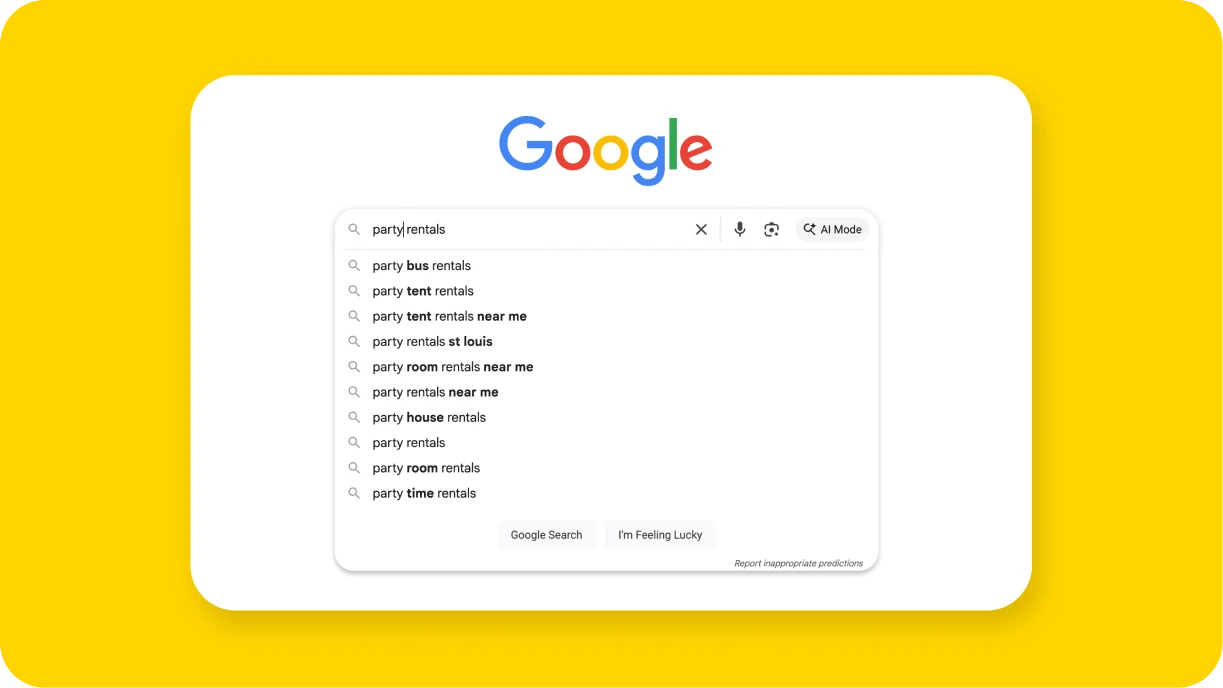
Create Content That Converts Searches Into Bookings
Of course, you can’t just throw up a bunch of random keywords on your website. They need to be packaged as useful, readable content with a clear structure.
Your content strategy needs to work for both traditional search engines and the growing world of AI-powered search. Whether someone is asking Google, Bing, or ChatGPT about party rentals in your area, you want to be the source that gets recommended.
The key is creating content that’s so genuinely helpful that both search algorithms and AI tools recognize you as the authority in your market. This means going beyond basic product listings to become the go-to resource for party planning guidance.
Write for Humans, Not Just Search Engines
The best party rental SEO content solves real problems for real people, not just search engines. Instead of stuffing your pages with keywords, focus on answering the questions your clients actually ask:
- “How many tables do I need for 150 guests?”
- “What’s the difference between a pole tent and a frame tent?”
- “How far in advance should I book party rentals?”
- “What’s included in party rental delivery?”
Create dedicated pages or blog posts that thoroughly answer these questions. Not only will this help you rank for relevant searches, but it’ll also position you as the expert who understands their needs.
Then, when AI search tools like ChatGPT or Google’s AI Overviews pull information to answer user questions, they’re more likely to reference your comprehensive, helpful content.
Showcase Your Inventory Strategically
Your inventory pages are SEO goldmines waiting to be discovered. Instead of generic product descriptions, write detailed, helpful content for each category:
- Before: “Round tables available for rent”
- After: “60-inch round tables seat 8 guests comfortably and work perfectly for intimate dinner parties, corporate luncheons, and wedding receptions. Our high-quality wooden tables feature elegant pedestal bases and can be paired with our premium linens for a polished look.”
The second version naturally incorporates keywords while actually helping customers understand what they’re renting. This detailed approach also makes your content more likely to be cited by AI search tools when users ask specific questions about table rentals.
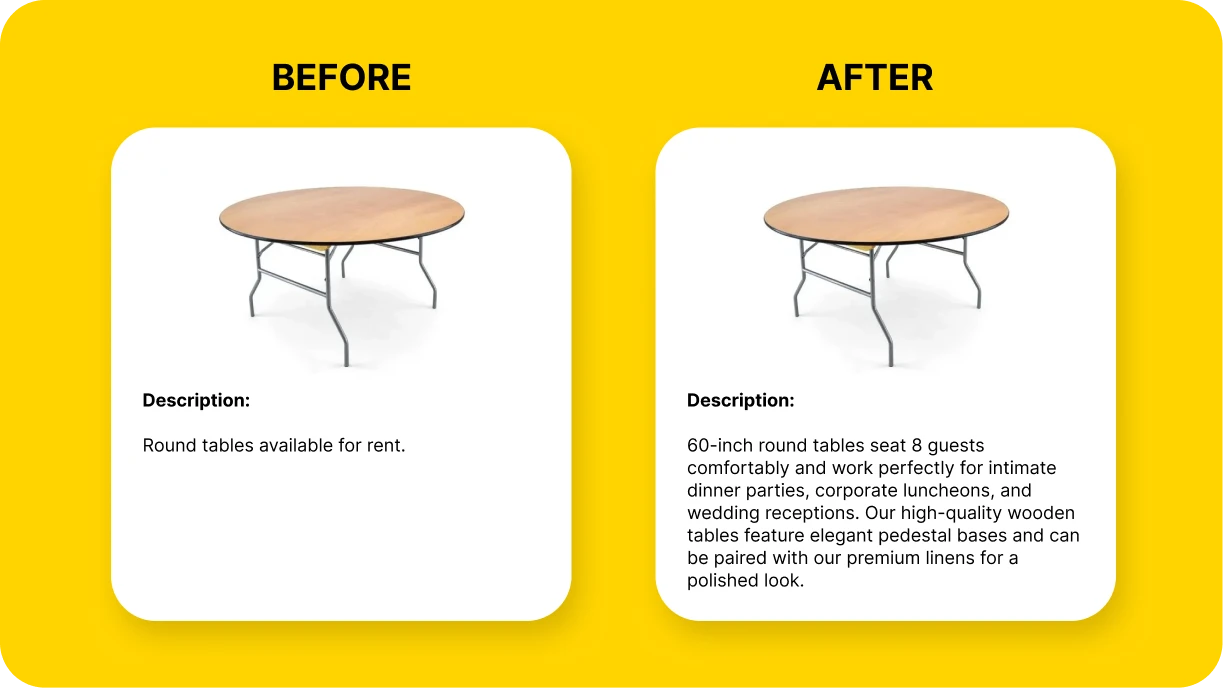
💡 Pro Tip: Use Goodshuffle Pro’s Website Integration to pull in all your inventory images, names, and descriptions in real time. This is a huge boost for SEO and for your client browsing experience. With the integration, clients can also submit inquiries that populate within Goodshuffle Pro — so you can book events in your sleep.
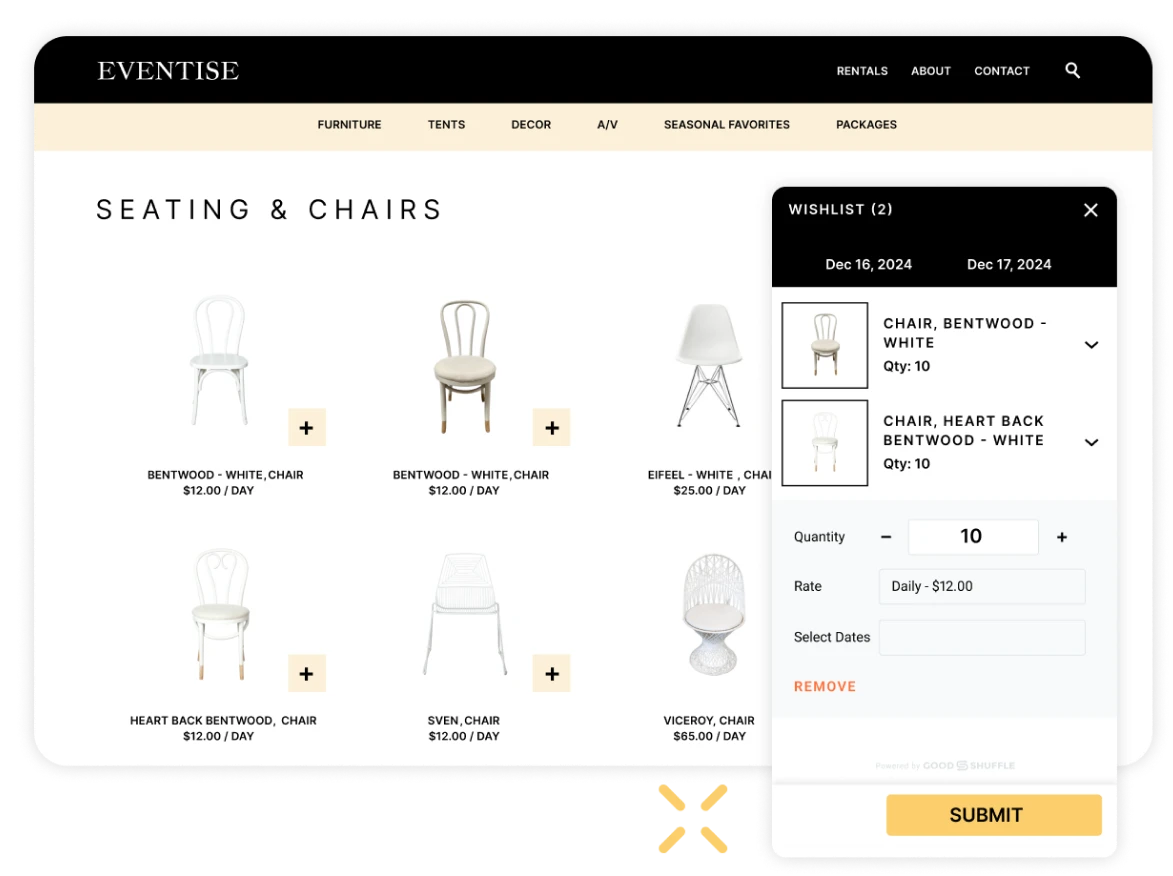
Technical SEO: The Behind-the-Scenes Magic
Everything we just discussed about content is called on-page SEO. But there’s another component called off-page SEO, which involves:
Making Your Website Fast and Mobile-Friendly
Your potential clients are browsing your inventory on their phones while planning events. If your site takes more than three seconds to load, they’re already looking at your competitor’s website.
Use tools like PageSpeed Insights to identify what’s slowing down your site. Common culprits include oversized images, too many plugins, or poor hosting.
Optimize your images. Those beautiful photos of your inventory can tank your site speed if they’re not properly compressed. Use tools like TinyPNG or ensure your web developer is handling this.
💰 Looking for website help? We’ve got recs
Structuring Your Site for Success
Create a logical site structure that makes it easy for both users and search engines to navigate.
Each page should have a clear purpose and target specific keywords related to that category.
For WordPress users managing their own websites, tools like the Yoast SEO plugin can help you implement structured data markup and optimize your technical SEO. Yoast automatically generates schema markup that helps search engines understand your content structure, business information, and services. If you’re using Goodshuffle Pro’s Website Integration, you’ve already got a leg up, as much of this structured data is already handled for you automatically.
Check out this example:
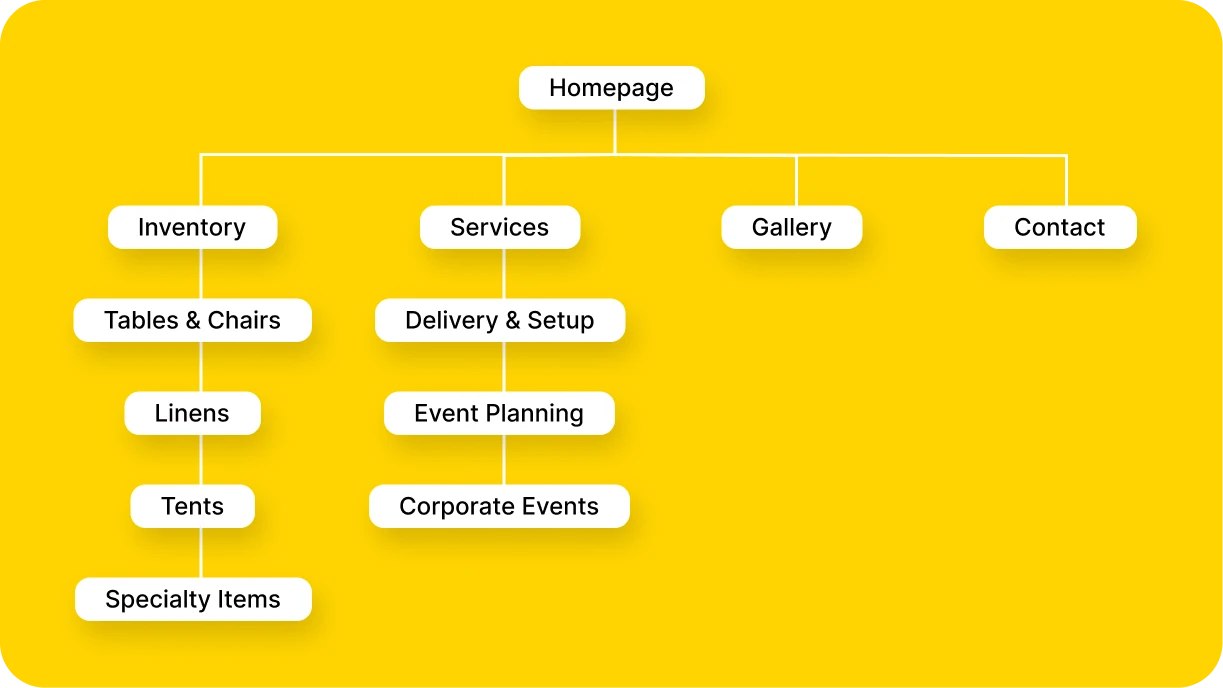
Build Authority Through Smart Link Building
Your website is a big part of your SEO performance, but it’s not the only part. When you’re frequently mentioned by authoritative sources, you’ll get more booking inquiries. A good starting point is to partner with local businesses. Build partnerships with:
- Wedding venues: Offer to provide content for their vendor directories
- Event planners: Create mutually beneficial referral relationships
- Photographers: Collaborate on styled shoots that showcase your inventory
- Caterers: Cross-promote each other’s services
These relationships often lead to natural link opportunities, which search engines love.
How to Measure Your SEO Performance
Don’t get caught up in vanity metrics. Focus on numbers that actually impact your business:
- Organic traffic impressions: Are more people seeing your content through search?
- Local ranking positions: Where do you show up for your target keywords?
- Conversion rates: Are your SEO visitors becoming customers?
- Call volume: Are you getting more phone calls from web searches?
Use Google Analytics, Google Search Console, and local rank tracking tools to monitor your progress.
But we’ll chime in here with a quick reality check: SEO for party rental businesses isn’t a sprint — it’s a marathon. You might not see dramatic results in the first month, but consistent effort over 3-6 months will start showing real impact.
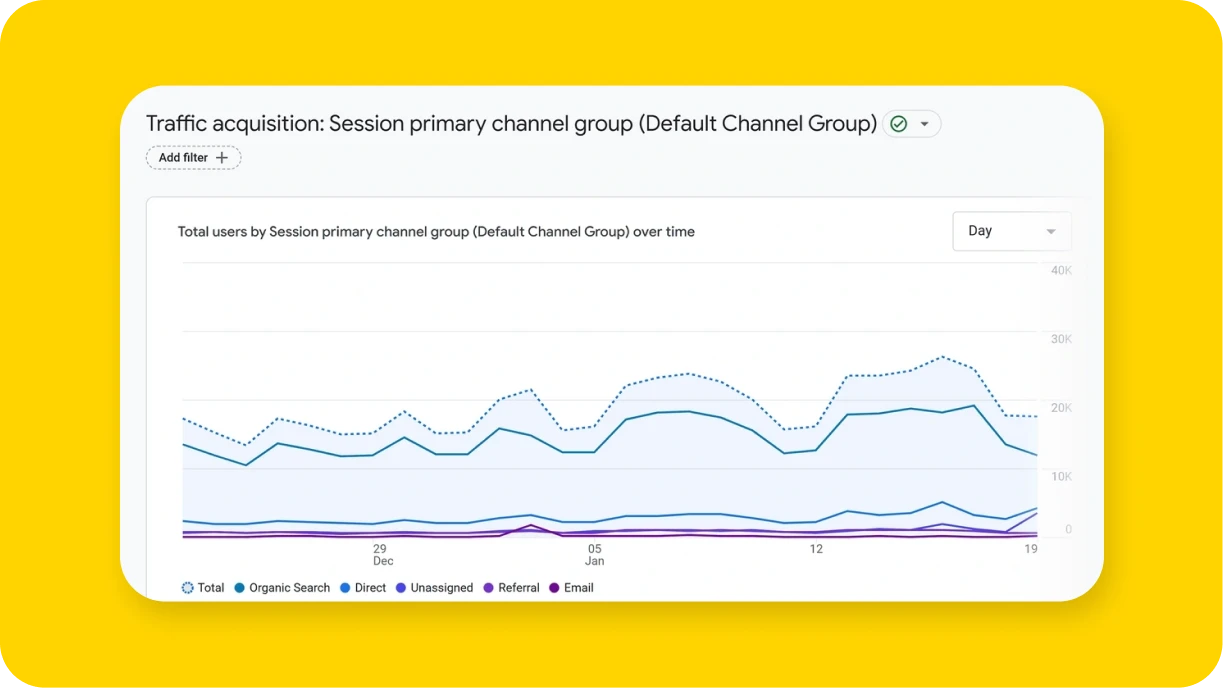
Your Next Steps: Building SEO Into Your Business
Start with the basics and build from there. Here’s your action plan:
- Week 1: Claim and optimize your Google Business Profile
- Week 2: Audit your current website for basic SEO issues & get set up with Goodshuffle Pro’s Website Integration
- Week 3: Research and create a list of target keywords
- Week 4: Start creating one piece of helpful content per week
- Month 2: Begin reaching out to local partners for collaboration opportunities
- Month 3: Implement tracking and start measuring your progress
Remember, every piece of content you create, every page you optimize, and every local citation you build is an investment in your business’s future visibility.
The party rental businesses that dominate their local markets aren’t necessarily the ones with the best inventory — they’re the ones that make sure their ideal clients can find them when it matters most.





